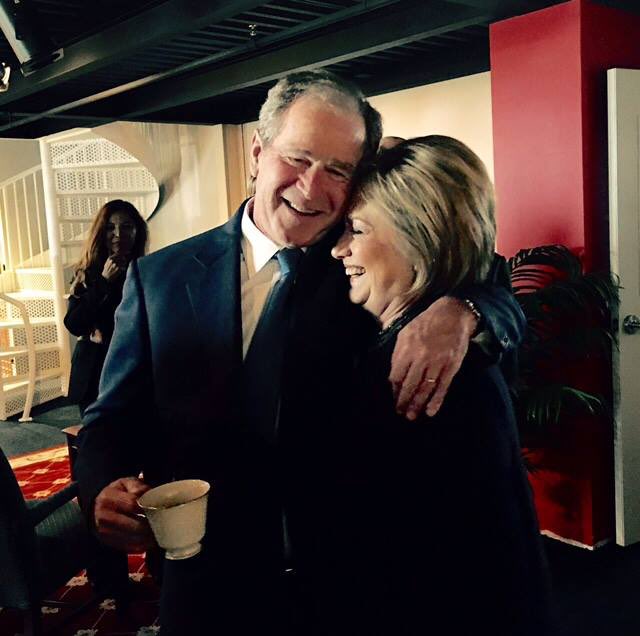
WASHINGTON POST
Donald Trump is trying to paint Hillary Clinton as soft on national security. That will be a hard sell.
-- Seizing on the Orlando attack, the presumptive Republican nominee gave a speech yesterday that mentioned Clinton 19 times. He uttered the words “terror,” “terrorism” or “terrorist” just five times. “Ask yourself,” Trump said, “who is really the friend of women and the LGBT community, Donald Trump with his actions, or Hillary Clinton with her words? Clinton wants to allow radical Islamic terrorists to pour into our country — they enslave women and murder gays.” He even said “the burden is on Hillary” to explain why his proposed ban on Muslims is a bad idea.
- These rhetorical attacks are much less likely to stick because Clinton has spent more than a decade defining herself as tough and strong on national security. It is one of the biggest advantages that comes from being such a known commodity and scrutinized public figure.
-- At the State Department, Hillary was consistently more willing to use military force than Barack Obama.She wanted to send more troops into Afghanistan than the president did, supported leaving a residual force behind in Iraq before the rise of the Islamic State, pushed for more aggressive intervention in Libya and backed proposals to arm the Syrian rebels.
While she was embracing the president during the primaries to lock up the African American vote, one of the few issues she broke with Obama on was deploying more special operations forces to Iraq than Obama had committed. She also advocated a partial no-fly zone in Syria, which he has resisted.
-- Hillary’s hawkishness goes back much farther than Foggy Bottom. Clinton made a strategic decision when she arrived in the Senate after her husband’s administration ended to get a seat on the Armed Services Committee. She voted for the Iraq war and sat on an emerging threats subcommittee, all with her sights set on seeking the presidency in 2008.
The chief strategist on that campaign, Mark Penn, outlined his theory of the case for how she could win in a 2006 memo. “Regardless of the sex of the candidates, most voters in essence see the president as the ‘father’ of the country,” Penn explained to Clinton. “They do not want someone who would be the first mama, especially in this kind of world. But there is yearning for a kind of tough single parent – someone who can combine the toughness they are used to with the negotiating adeptness they believe a woman would bring to the office. They are open to the first father being a woman.”
“And the best role model proves the case,” Penn continued. “Margaret Thatcher was the longest serving Prime Minister in British history, serving longer than Winston Churchill. She represents the most successful elected woman leader in this century – and the adjectives that were used about her (Iron Lady) were not of good humor or warmth. They were of smart, tough leadership. As we move forward, it is important to understand who we are and who we are not. We are more Thatcher than anyone else.”

-- Democrats historically have a disadvantage on national security, but Clinton holds her own against Trump in public polling. Our Washington Post/ABC News poll last month found that voters narrowly saw the former Secretary of State as more equipped to fight terrorism than Trump (47 percent to 44 percent), and she blew him out of the water on who people were more comfortable with to tackle “an international crisis” (55 percent to 36 percent nationally). In the same poll, Trump and Clinton tied when voters were asked to pick “the stronger leader.” And Clinton had a statistically-insignificant 3-point edge on the question of “who would do more to make the country safer and more secure?”
-- Clinton made a savvy strategic decision last year not to tack left on national security during the primaries.She lurched leftward on everything from trade to Wall Street to head off Bernie Sanders’s unexpectedly strong insurgency, but she more or less stuck to her guns on national security – even in the face of intense attacks over her Iraq vote. She vigorously defended her hawkish posture in Libya and Syria during the debates, while expressing more regret for her vote on Iraq than she did last time. She also defended her relationship with Henry Kissinger, who many on the left loathe. The campaign was playing a long game, and they knew that there would be long-term costs for articulating more dovish positions.

-- Hillary’s resolute speech in Ohio yesterday afternoon was Thatcher-esque. "The attack in Orlando makes it even more clear: We cannot contain this threat; we must defeat it,"Clinton said in Cleveland, channeling the Iron Lady. In an effort to come across as presidential, she was low key. But her rhetoric was tough as nails.
Clinton, who supported the Patriot Act as a senator (which Sanders opposed), spoke about expanding surveillance and “an intelligence surge.” She said stopping “lone wolves” would be a top priority and chastised U.S. allies like Saudi Arabia and Qatar for funding terrorism.
She made clear that she subscribes to the Theodore Roosevelt philosophy that the U.S. ought to speak softly and carry a big stick. “An attack on any American is an attack on all Americans,” Clinton said.

-- In many ways, neoconservatives are more comfortable with the prospect of a Clinton presidency than a Trump presidency. They do not like her, but they see her as a reasonable realist who they can work with. They see Trump as a loose cannon who has no core beliefs and does not understand how the world works.